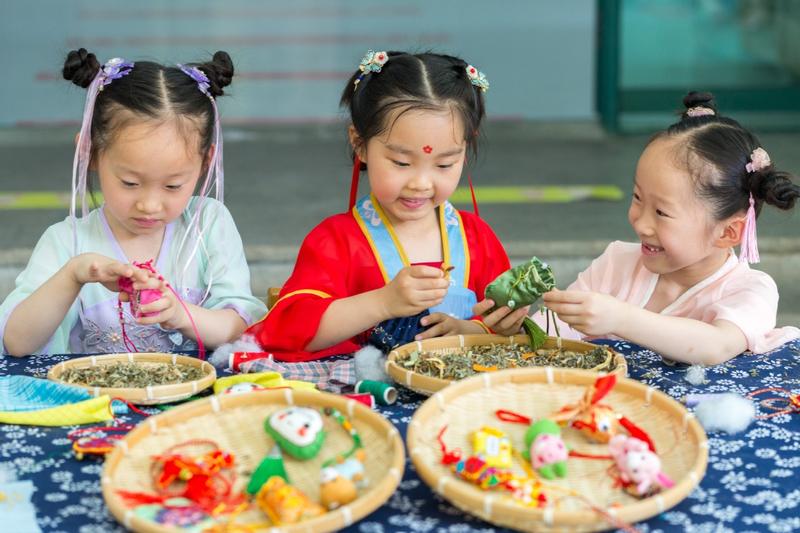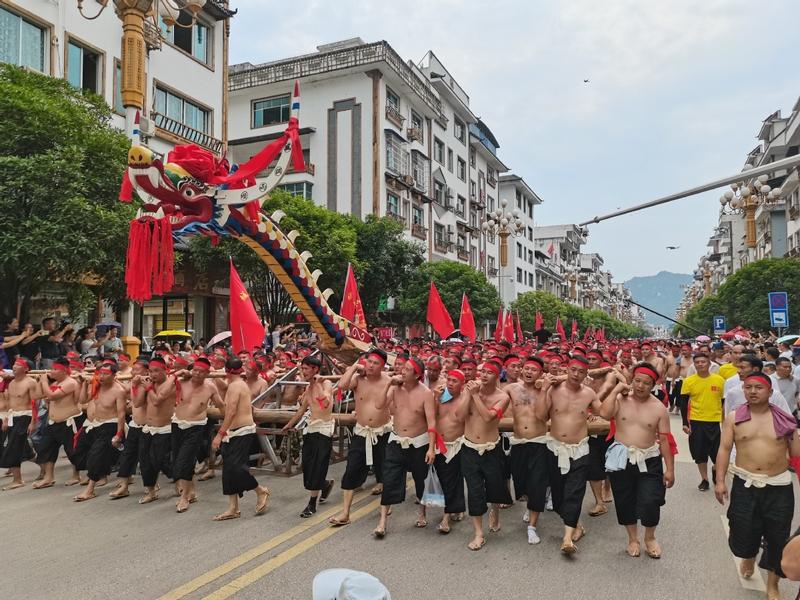 Children learn to make sachets in celebration of the upcoming Dragon Boat Festival at a kindergarten in Huzhou, Zhejiang province, on June 9, 2021. (PHOTO / FOR CHINA DAILY)
Children learn to make sachets in celebration of the upcoming Dragon Boat Festival at a kindergarten in Huzhou, Zhejiang province, on June 9, 2021. (PHOTO / FOR CHINA DAILY)
Traditional Chinese festivals always have their symbolic foods-especially the four traditional big festivals. For Spring Festival, people think of dumplings. For Mid-Autumn Festival it's mooncakes. Tomb Sweeping Day has green rice balls. And the Dragon Boat Festival-or Duanwu Festival-features zongzi, or sticky rice dumplings.
There is always a core idea behind each festival. Reunion is the theme of the Spring and Mid-Autumn Festivals, while memorializing and worshipping ancestors is the core idea of Tomb Sweeping Day.
For the Dragon Boat Festival, which falls on the fifth day of the fifth month of the lunar calendar, getting rid of disease, avoiding disasters and wishing for good health are the core ideas.
Based on ancient writings, Chen Lianshan, a professor of Chinese folklore, thinks that 2,000 years ago the Duanwu Festival was closely related to people's wishes to prevent epidemics, ward off devil spirits and wish for good health.
Xiao Fang, a sociologist at Beijing Normal University, thinks that as a traditional festival Duanwu ranks second only to Spring Festival because its month is associated with bad luck and devil spirits. A major activity to celebrate Dragon Boat Festival is a race of dragon boats, which is thought to calm those spirits.
Wen Yiduo (1899-1946), a poet and academic, wrote that on the fifth day of the fifth month, people threw rice dumplings into the water and raced the dragon boats-activities expressing awe of the dragon below and the hope that it will not make trouble in the days to come.
ALSO READ: Dragon Boat Festival celebrated across China
Besides racing dragon boats, people also hang sweet sedge and wormwood on their front doors, drink realgar wine and make pouches filled with herbs, all customs to get rid of evil spirits.
Though it's a traditional festival, the Dragon Boat Festival holiday was not made a public holiday until 2008, together with Mid-Autumn Festival and Tomb Sweeping Day.
History and origin
The history of the Duanwu Festival dates to the Warring States Period (475-221 BC). The most widely known story of Duanwu in contemporary China is that it was started to remember Qu Yuan, a patriotic official from the state of Chu (today's Hubei province) who committed suicide on the fifth day of the fifth lunar month. People rowed a boat to find him but failed, so they threw sticky rice dumplings into the river so the dragon underwater would not eat his body.
In eastern China, however, Duanwu Festival memorializes another patriotic official, Wu Zixu from the state of Wu (today's Jiangsu province), whom the king mistakenly ordered killed and thrown into the river on the fifth day of the fifth lunar month.
In both regions, dragon boat racing is a popular activity during Duanwu Festival.
According to Wen Yiduo, the practice of racing dragon boats first appeared in the states of Wu and Yue in what is now eastern China. Wen reached this conclusion because the dragon was the totem for tributes in these states and dragon boat racing activities were held to make sacrifices to dragons.
 More than 2,000 adult males lift the dragon canoe in Shibing county, Guizhou province, on June 9, 2021. (PHOTO / FOR CHINA DAILY)
More than 2,000 adult males lift the dragon canoe in Shibing county, Guizhou province, on June 9, 2021. (PHOTO / FOR CHINA DAILY)
READ MORE: China expects 100m trips during Dragon Boat Festival holiday
Events and commemorations
In Qu Yuan's hometown, Zigui county in Hubei province, a series of events are held to honor Qu Yuan annually. For people in Zigui, Duanwu is even more bustling than the Spring Festival. People celebrate in three different phases, on fifth day of the fifth month of the lunar calendar and on the 15th day and 25th day of the same month.
On what's known as Double Fives Day, people in Zigui will gather at rivers and temples to worship Qu Yuan. Rituals of sacrifice, as well as the music and clothing replicate the ancient routines of the state of Chu.
Before the race of dragon boats on that day, rowers hang a red cloth, and a drummer on the boat sings, "My dear brother please come back."
Zheng Da, a 32-year-old restaurateur from Zigui has been racing dragon boats for more than a decade.
"I'm in the third generation of rowers in my family, and I watched my grandfather and father race since I was very young," Zheng said. "It is not difficult to learn, and not very dangerous if one can swim. I'm not only a rower, but also a drummer and a coach."
Zheng is planning to pass the skill to his 4-year-old son.
For Zheng, racing the dragon boat is more than a childhood tradition. When working together with other 19 people on a boat, teamwork is the quintessential element.
"To compete together with teammates to achieve something is very fulfilling," Zheng said.
Every year, 10 days before Duanwu Festival, Zheng will start practicing for the competition.
"The tradition has not changed since my childhood. People join a poetry society and read poems and race the dragon boat. Also kids take baths in water with wormwood leaves."
In 2011, Zigui was named the hometown of the dragon boat by the General Administration of Sports of China.
In Zigui, people also make and eat rice dumplings, drink wine with realgar powder, hang sweet sedge and wormwood on the front door and fill pouches with herbs, using five-colors of string.
Another major event in Zigui is reciting poems to remember Qu Yuan. The history of the poet society in Zigui dates to the Ming Dynasty (1368-1644). Currently, there are 15 poet societies and around 200 poets in Zigui.


